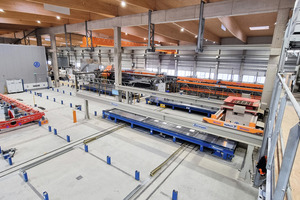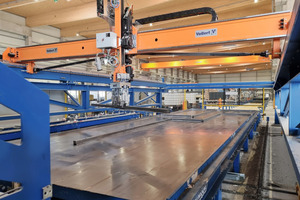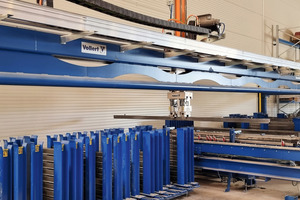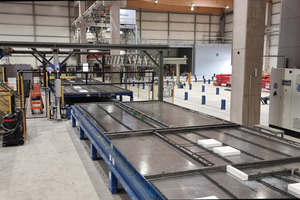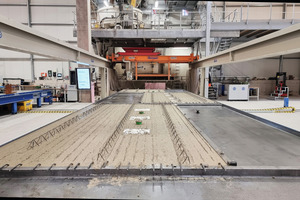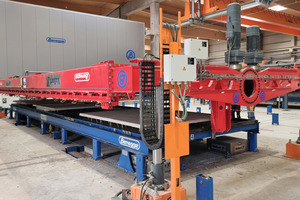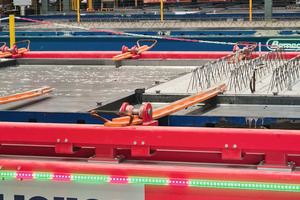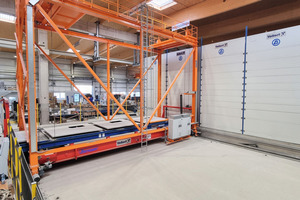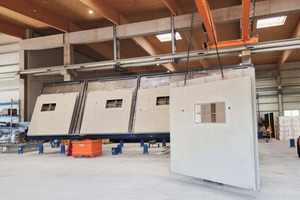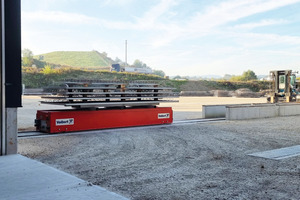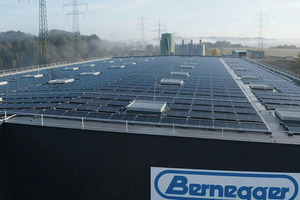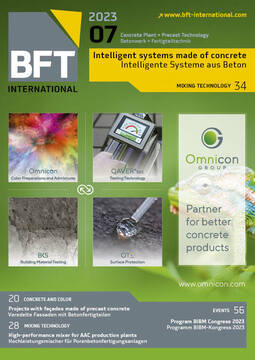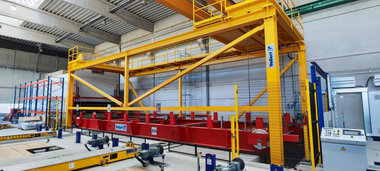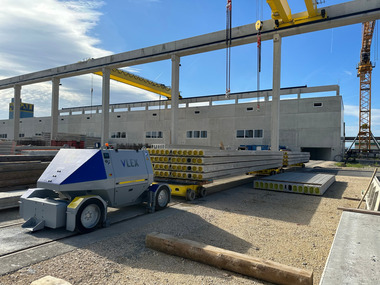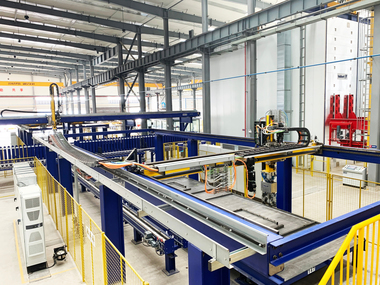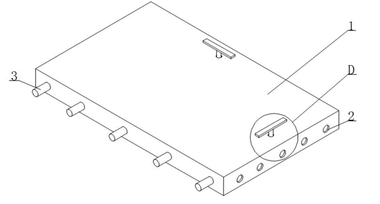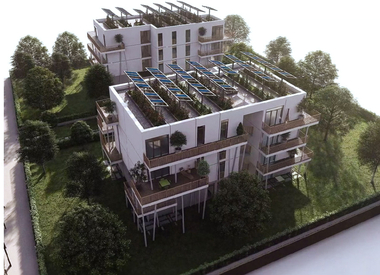Bernegger Group once again acting as a pioneer with Austria’s first energy-neutral precast concrete factory
Bernegger Group has a tradition of always thinking one step ahead –as it enters the precast concrete industry. Since May 2022, double walls and prefabricated ceiling slabs for residential and commercial construction have been produced perfectly energy-neutrally in Dietach, Upper Austria.
Bernegger Group has a tradition of always thinking one step ahead – be it in the raw materials industry, the construction industry, or in environmental technology. The same is true as it enters the precast concrete industry. Since May 2022, double walls and prefabricated ceiling slabs for residential and commercial construction have been produced perfectly energy-neutrally in Dietach, Upper Austria.
“Our claim as a family-owned enterprise is supplementing tradition with new innovative growth areas to keep us fit for the future,” Kurt Bernegger, owner and managing director of the eponymous Bernegger GmbH, explains. Know-how in civil engineering, special civil engineering, and well construction as well as in recycling and waste management is complemented by raw materials competence. Bernegger has been supplying the construction and concrete industries with raw materials from in-house gravel mills and crushed-stone plants since the 1970s. It is operating a number of concrete factories throughout Austria as well.
Entering the precast concrete industry was the logical next milestone in Bernegger Group’s long success story. The group acquired precast-concrete specialist Ratzinger from Steyr in 2019. Until then, the company mostly produced prefabricated ceiling slabs for residential construction, along with customized concrete products such as balconies, beams, concrete blocks, and stack systems, in a stationary facility.
Remarkable entry into Europe’s precast concrete industry
“Europe’s construction industry is facing some major challenges, including soaring raw-material and energy prices, turbulent supply chains, development of sustainable construction processes, and resource-efficient manufacturing methods with the lowest possible carbon footprint. However, the shortage of skilled workers is a key issue both at the moment and in the long term. This is where versatility and flexibility come in handy, along with constant investments that render the construction process more efficient. A high level of automation is essential to remain competitive here,” says Kurt Bernegger.
“Always one step ahead – future-oriented ideas and new innovation fields always keep us in a progressive role in shaping the technology on the markets,” DI Kurt Bernegger, authorized signatory for the group and member of the executive board at Bernegger, explains. He is also responsible for technology and investments within Bernegger Group. “For example, we are currently building Europe’s most state-of-the-art recycling sorting plant for lightweight packaging in Enns, investing €60 million for better climate protection and regional value creation.” The newly added precast concrete sector has also relied on new, groundbreaking technology and state-of-the-art machinery and robotics from the outset. “From the very beginning, we were striving to build Europe’s most state-of-the-art precast concrete factory. Energy neutrality for better climate protection was another vital factor,” explains DI Kurt Bernegger.
The cornerstone was laid with the strategic decision to build the new precast concrete factory at the heart of Upper Austria. Dietach has been a central gravel mining site within Bernegger Group for two decades, offering optimized synergy effects, elimination of transport routes, and reduction of energy costs.
Fully automated with lots of robotics and efficient processes
“Bernegger is relying on a concept of well-trained specialists combined with cutting-edge plant technology in Dietach,” Markus Schenk, project manager sales at Vollert, who has been involved in the project since initial talks commenced back in 2018, explains. “Switching from strictly stationary production lines to a highly automated concept for double walls and prefabricated ceiling slabs required inspiring the available specialists with our vision from the outset and offering them intensive training. Another important factor was optimizing working conditions,” explains DI Kurt Bernegger. To this end, the plant layout was very generously designed and optimally lit. The focus was on natural materials such as wood in the roof truss, and great care went into limiting the noise generated by the machines.
Quality is another important value in Bernegger’s tradition. “Consistently living up to the high quality requirements of our customers in the construction industry was and remains our benchmark – every single day,” DI Erich Moser, plant manager at the Dietach site, says. Dimensional accuracy and surface quality are the main factors for walls and slabs, rendering the plant technology in production essential. “Particular attention is paid to the concreting, compaction, and curing processes as well as to a fully automated molding process. The Smart Set line offers state-of-the-art CAD/CAM-controlled robotics for this purpose,” says Markus Schenk from Vollert. The Smart Set2 molding/demolding robot is a multifunctional robot of the latest generation, combining innovative technology with high traversing speed and acceleration. The Smart Set robot line at Bernegger positions the Stepless 1040 molding system controlled by CAD/CAM to match the type of wall or slab, pre-plots the contours for fixtures and reinforcement components at need, and can place up to four box magnets at the correct distance at the same time. Polystyrene supplements become limited to some special geometries this way. An optical scanning system scans the surface to register the type and position of the support profiles before the Smart Set removes them and feeds them to the cleaning process. A Smart Store magazining robot then takes care of intermediate storage of the support profiles in the storage magazines or retrieval onto the feed line for the next molding process.
Individual reinforcement wires as well as the lattice girders are inserted using a fully automatic AWM reinforcement system with a multi-line straightening and bending machine, an efficient cutting and welding system for the lattice girders, and an Autolayer robot for depositing the bars and lattice girders. Installation parts such as sockets and window frames, as well as reinforcement supplements, are placed manually. Quality control at the manual workstations uses laser projectors.
Tough Cast technology in concreting
Cutting-edge concrete distributors increase productivity in the precast concrete factory with their precise and quick traveling and optimized concrete discharge. Precise concrete batching warrants precisely calculable material usage, while the CAD/CAM-based track control system ensures a consistently homogeneous discharge. “A fully automatic, gantry-guided Smart Cast concrete distributor optimizes concreting at Bernegger,” explains Jürgen Hesselbarth, project manager at Vollert. The screw drives are controlled individually or in groups in automatic mode. Sealing caps keep the discharge clean. A rotating distributor roller prevents pouring cone formation while ensuring outstanding concrete flow towards the discharge.
Vollert’s discharge screws and channels are made of fully cast, post-hardened steel that is significantly more resistant to wear thanks to its Tough Cast technology. “A special changing device is another outstanding feature. It makes quick exchange as simple as changing a tire on a car,” explains Jürgen Hesselbarth. The drive shaft remains in its storage position when the discharge screw is being replaced, significantly saving on time and costs alike. Cast iron is used instead of sheet steel for the discharge channel, the screw’s counterpart. The discharge channels are inserted individually and can, therefore, also be replaced separately, rendering maintenance much easier.
Concrete compaction with a Vario Compact shaker-vibration station optimizes energy input into the prefabricated ceiling slab and ideally compacts the more heavily reinforced supporting shell of double walls. Low-frequency vibration to compact the concrete is produced by four unbalance drives. Compaction energy is adjusted automatically based on the dead weight of the wall or slab for optimized circular vibration subject to low noise development. An insulated Vario Cure curing chamber with four rack towers and a total of 44 curing stations ensures an energy-efficient curing process. A special CureTec heat circulation system keeps climate conditions constant. The set temperatures are consistently warranted throughout the chamber area by sufficient hot-air circulation produced by high-performance fans. The hot-air generator supplies the heat required for accelerated curing of the walls and slabs.
A stationary Vario Turn pallet turning device ensures a simple semi-automatic turning process and particularly ergonomic workflows in double-wall production. Rather than elaborately inserting the clamping arms for pre-locking the first shell manually before turning, they now remain directly on the turning device to hold the first shell of the double wall securely on the turning beam while lifting and turning. An automatic wall thickness adjustment automatically applies the height of the double wall. The height fixation of the clamping arms is variable as well. An LED indicator bar developed by RIB SAA on the long sides of the turning device shows the adjustment positions where no clamping arms must be inserted.
Ergonomic and safe loading for construction site transport
Loading technology is also characterized by efficient processes. A Vario Tilt tilting station lifts double walls vertically as a hydraulic support beam moves against the wall element, preventing it from slipping while tilting. Elements are loaded directly into transport racks.
The prefabricated ceiling slabs are lifted off via a Smart Lift lifting beam and prepared for loading and transport to the customer’s construction site after curing is complete. The slab stacks are transported outside by a removal truck. The ceiling elements are set down directly on the customer’s set-down pallets or on transport racks positioned on these. A hydraulic lifting unit lifts the stack or transport rack from the set-down pallet and removes the stack or transport rack.
Smart Factory concept with an ITWO MES control system
Bernegger relies on an Industry 4.0 concept for optimal and economical control of all processes. “As in a digital factory where machines communicate smartly with each other by digital data flows. We start out by receiving the customer’s architectural data virtually in constructive 3D BIM models, followed by industrial production with innovative CAD/CAM robotics and high automation in series production. The important things here are optimal exchange and transfer of relevant information regarding drawings, material stocks, inventory, and logistics,” explains plant manager Dipl.-Ing. Erich Moser. The company relies on the smart ITWO MES production system from automation specialist RIB SAA Software Engineering for this.
A smart factory like the one here in Dietach has all processes and machines fully digitally controlled and monitored. Throughput times and automated pallet occupation are continually optimized. Data are tracked and prepared automatically, retrieval sequences and curing times are managed, and many statistics are provided. Component drawings, occupation plans, order batches, as well as the current inventory levels are always visualized and can be retrieved with cutting-edge hardware, such as tablets or large multi-touch flat screens. “We really don’t need any paper anymore at all today,” Moser continues.
The first energy-neutral precast concrete part production in Austria
“Digitization is a key challenge for economic work today. Climate protection and sustainability are some further important values for us in the Bernegger family, incorporated into all decisions. As a result, we were striving from the outset to operate completely energy-neutrally in Dietach. The new precast concrete factory probably is unique in all of Europe with this,” Kurt Bernegger says. The photovoltaic system on the roof produces more electricity than the entire plant consumes in operation. There’s even more: geothermal energy and heat pumps are used to heat groundwater and operate the heating system and curing chamber air conditioning. “Experience from the first few months shows that the system is proving its worth as a pioneering concept.”
The first construction sites have been supplied
“We are currently producing about 1,000 square meters worth of prefabricated ceiling slabs per day in a single shift, plus several hundred square meters of double walls,” explains DI Kurt Bernegger. “In light of the set target of market entry in the fall of 2022, contract awarding to our project partners happened relatively late in January 2021. We had a very ambitious construction schedule. We were aware that Vollert, AWM, and SAA would be under some real pressure to comply with the specified time window by the time the building shell was completed. On-time delivery worked, however, which is particularly impressive since the entire process of assembly and acceptance took place during the Covid-19 pandemic.”
“In retrospect, Vollert, as an experienced plant expert, turned out to be the perfect partner for us. Their many technical and business inputs have driven the project and their cooperative interaction of many years and future-proof options ultimately convinced us,” adds DI Erich Moser. Bernegger Group considers itself well-positioned for further growth and future expansion plans today.

